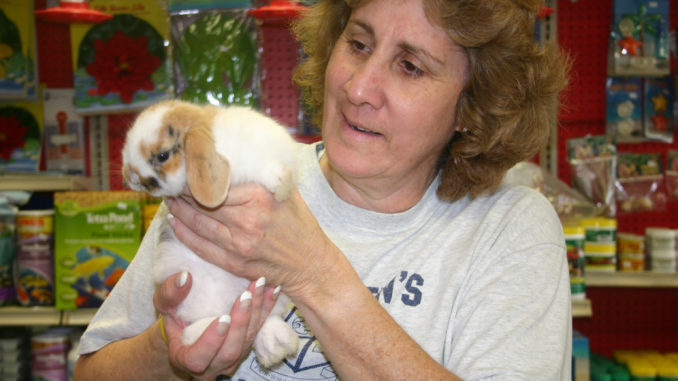
Chocolate bunnies are easy to take care of – all you have to do is eat ‘em. But real bunnies require TLC and lots of it. Here’s how to be kind to yours …
With Easter here many of us feel the impulse to give our children and loved ones colorful Easter baskets brimming with surprises. One such “surprise” might be a velvet-eared, live, baby bunny adorably nestled among green plastic grass and pastel chocolate eggs.
While it is often tempting to give those cuddly little creatures as pets at Easter, there are cautions. You need to understand the nature and needs of rabbits before taking “the bunny plunge.”
While rabbits do make wonderful companions, potential “pet parents” should know exactly what to expect before adopting or purchasing a bunny – and that begins before the rabbit enters you home.
And the owner of Bayou Pets in Destrehan agrees.
“I would recommend not giving a rabbit as an Easter present unless the person you are giving it to knows that they are getting it,” says Janet Long.
“And that person should also know how to properly take care of it.”
To ensure you are giving your rabbit the absolute best care from the get-go, research diet, health, behavior, socialization, housing, bunny-proofing and proximity to an appropriate vet before your pet comes home.
And Long suggests that kids age 5 and under shouldn’t be given a rabbit as a pet.
Below are some tips from Marie Mead, author of Rabbits: Gentle Hearts, Valiant Spirits that will ensure your new rabbit will have the home it deserves.
Handle with care.
Rabbit injuries can result from improper handling, especially by children. It’s common for youngsters to hold rabbits too tightly or to pick them up by their ears.
Pet care takes time.
Parents should know what is involved in the general care of the bunny and use that knowledge to teach the child and consistently model appropriate care. Let children assist whenever possible and carefully supervise any care they provide independently. Include your child in the new things you are learning about rabbits and their care.
Bunny-proofing is required.
Rabbits present some challenges for people unfamiliar with the small creatures’ natural instincts for chewing and digging. Being proactive and taking preventive measures – such as making things inaccessible, using deterrents, and providing safe items for chewing and digging – are essential.
Rabbits need room.
Rabbits instinctively avoid relieving themselves in areas where they eat or sleep, which means your pet’s condo should include enough space to accommodate a litter box away from those areas.
To sum it all up, what are the two most important things you can do to stop the trend of rabbit neglect and abuse during this time of year?
Quite simply, don’t buy a baby bunny as an Easter gift – unless you are a) thoroughly educated on rabbit behavior and care, and b) 100 percent committed to making the bunny a beloved member of your family for his or her lifetime.




Be the first to comment